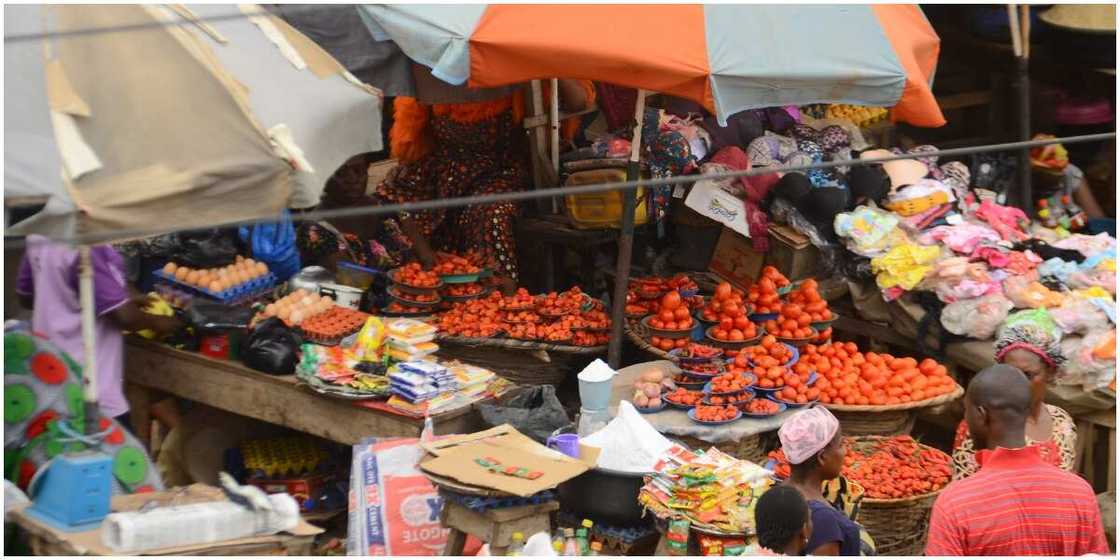States With Highest, Lowest Food Inflation Rate in Nigeria
- Inflation rate increased to 17.33% last month, surpassing the inflation rate of 16.47% recorded in January
- Food inflation hit the highest rate in four years, rising to 21.79% in February, against the 20.57% in January 2021
- Kogi State, Ebonyi State and Sokoto State recorded the highest inflation rate on a year-on-year basis
Nigeria's inflation rate rose by 17.33% on a year-on-year basis in February 2021, making it the highest in four years. Last month's rate is 0.86% higher than the 16.47% the Nigerian Bureau of Statistics (NBS) reported in January 2021.

Read also
Trouble for Nigerians as country's inflation rises to 17.33% in February, highest in four years
The NBS consumer price index reported the headline index increased by 1.54% in February 2021 on a month-on-month basis, while food inflation rose by 21.79% last month, surpassing the 20.57 percent in January 2021.
According to the NBS report, bread and cereals, potatoes, yam and other tubers, meat, food products, fruits, vegetable, fish and oils and fats caused the rise in food inflation.
It was gathered from the inflation data that urban inflation, in February, hit 17.92% on a year-on-year, rising from 17.03% of the preceding month. NBS stated that rural inflation rate rose from 15.92% in January, to 16.77% the next month.
NBS report stated:
"On a month-on-month basis, the urban index rose by 1.58 percent in February 2021, up by 0.06 the rate recorded in January 2021, while the rural index also rose by 1.50 percent in February 2021, up by 0.04 the rate that was recorded in January 2021 (1.46) percent."
States with the highest, lowest inflation rate
The inflation report grouped three states with the highest inflation rate and lowest inflation, including food inflation.
On a year-on-year basis for the highest inflation rate, Kogi State inflation hit 24.73%, inflation rose to 22.92% in Bauchi State, while Ebonyi recorded an inflation increase of 20.45%.

Source: Getty Images
While the lowest inflation rate was recorded by Cross River which experienced 12.97% inflation increase in February, Kwara State accounted for 14.25% inflation rate and Enugu State's inflation rate hit 14.73%.
For food inflation, Kogi State recorded 30.47%, Ebonyi State inflation rose to 25.73%, while in Sokoto State, it increased to 25.68% on a year-on-year basis.
The lowest food inflation rate was recorded in Akwa Ibom, which saw an 18.70% rise, NBS reported Bauchi State had 18.74% and Gombe State recorded 19.32% food inflation.
Impact of rising inflation
The rise of inflation in Nigeria is increasing the cost of living in the country where unemployment has been on the rise. Legit.ng had reported that Nigeria's unemployment rate rose at the end of last year, rising by 33.3%.
The number of unemployed Nigerians was put at 23 million. With inflation on the rise, the living conditions of many Nigerians will worsen, and purchasing power will decline due to the high cost of goods and food items. Also, with the government considering increasing fuel price and coupled with high electricity tariff, many households will be pushed across the poverty line.
Meanwhile, Legit.ng had earlier reported that Nigerian automaker, Innoson Vehicles, refuted a report that it is accepting cryptocurrency as payment for its cars.
The Owerri-based company stated that it is in support of the Central Bank of Nigeria's decision to ban cryptocurrency, so it won't be associated with the digital asset.
Fakoyejo Olalekan is a Business and Financial Journalist with over three years of experience in covering finance and business activities within Nigeria and offshore. Prior to joining Legit.ng, he worked at Nairametrics where he wrote financial and investment analysis articles. Olalekan is a resourceful and result-driven journalist with a track record for conducting extensive research and interviews to produce articles that provide different perspectives to market activities.
Source: Legit.ng




